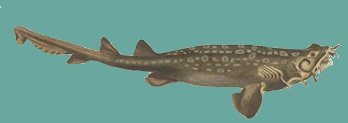Magnetic study could help to protect wobbegong sharks
Magnetic study a potential bonus for lobster fishermen
 News Release by the Australian Maritime College ( AMC ),
4. January 2012
News Release by the Australian Maritime College ( AMC ),
4. January 2012
An AMC student’s honours research project has found a cost effective way to not only increase the yields of Tasmanian Southern Rock Lobster fishermen, but also protect the threatened species of Wobbegong shark.
Will Hansen spent 2011 studying the effects of magnetic fields on sharks as his Honours project for his Bachelor of Applied Science (Marine Environment).
Sharks of all kinds have a sixth sense. Their electro-sensory system is designed to pick up electric fields given off by their prey. But, it was discovered in 2006 that this also means that the species is susceptible to magnets.
“Magnets over stimulate their sensory pores, and this over-stimulation deters them. It appears to give them a headache,’’ Will said.
In 2006-07 rock lobster represented 12 per cent of the value of all Tasmania’s seafood, according to ABARE Australian Fisheries statistics. However, the industry has always been troubled by the issue of by-catch.
“There is definitely a shark by-catch problem in the Tasmanian Rock Lobster industry, mainly with the draughtboard shark,’’ Will said.
The draughtboard shark (Cephaloscyllium laticeps) is a stocky species that has a short broad head. It grows to about 1.5m in length and is endemic to Australia, occurring from the central coast of New South Wales, around the temperate south of the country, including Tasmania, to south-eastern Western Australia.
It is a benthic (bottom dwelling) species that occurs most commonly in continental shelf and continental slope waters down to at least 650m, but is sometimes seen by divers in relatively shallow waters
“I thought there must be some kind of solution involving magnets to stop these sharks getting into pots.”
Will’s study investigated magnetic fields as an electro-sensory deterrent to mitigate shark by-catch in the Tasmanian Southern Rock Lobster Fishery. Both fishery dependent and baited video sampling techniques were used to investigate the deterrent effects of magnets on draughtboard shark by-catch.
Magnets were attached to the entrance of pots and shark by-catch rates and behaviour was observed and quantified.
The presence of the magnets significantly reduced mean draughtboard shark catch rates in one of the three trials (45% reduction in shark by-catch in the north-western Tasmanian trial).
The video sampling suggested that magnet location on the pot was an important factor influencing the shark interaction with the magnetic field.
Will said that he had found out some other interesting behavioural information while conducting his magnetic study.
“Shark presence was actually reducing lobster catch rates, potentially by up to 75 per cent,” he said.
“When the sharks enter the pot the lobsters will either get out of the pot, or they will stop lobsters getting into the pot all together because they are a predatory species.
“So it stands to reason that, if we could decrease the shark by-catch by half, we could increase catch rates, and therefore profits.”
Will said that, while further trials were needed, he would one day like to see magnets incorporated into all pot and trap gear nationwide.
“It should be easy to introduce. It’s monetarily beneficial so fishermen should want to take it up,’’ he said.
“Rock lobster is a quota fishery, so it’s all about improving efficiencies. Fishermen can not only save money by reducing shark by-catch, but they would have to go out a lot less days to catch the same amount of lobsters.
“The increased profit margin would easily cover the cost of the magnets on the pots in one trip.”
Will also said that he would like to see his research applied to a fishery where threatened species are a by-catch problem.
“I would like to transfer my research across to mainland waters where threatened wobbegong species are captured. They have to do everything they can to try and mitigate the wobbegong by-catch,’’ he said.
He hopes to get the chance to take his research back to a more controlled lab environment to refine his concept and fine-tune the best magnets for the task.
“This has been classed as a very novel project because nothing like this has ever been done within the rock lobster fishery. But, there were encouraging results and plenty of options for future research,’’ he said.
Will has now secured employment as a By-catch & Discards Management Officer with the Australian Fisheries Management Authority (AFMA) in Canberra.
Source: Australian Maritime College ( AMC ), an institute of the University of Tasmania.
